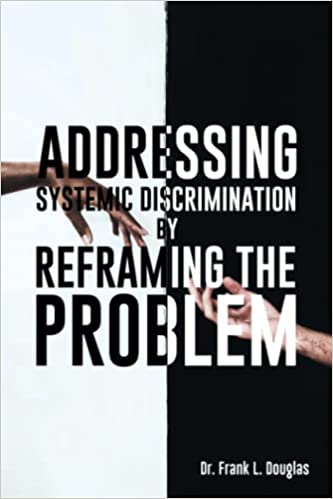Reframing Enables Constructive Change in All Walks of Life!
“Reframing.” When I use the term, I’m usually thinking about it as Neuro-linguistic Programming (NLP). That is one of the many techniques in which I’m certified for helping people get over fears, limiting beliefs, and other conditions that prevent them from making progress or constructive changes in personal or business growth on an individual or small group level. However, the concept is equally applicable when applied to societal maladies.
neu·ro·lin·guis·tic pro·gram·ming
noun
a system…intended to educate people in self-awareness and effective communication and to model and change their patterns of mental and emotional behavior.
Bottom Line: organizations, companies, and other interactive groups of all kinds need help in understanding and overcoming “societal ills” that result from various forms of ignorance and prejudice. Reframing is useful and can be taught easily. I’m going to share information about an approach that enables one to deal with issues that are readily recognized and to find ways for handling them in a manner that is productive for the aggrieved as well as others in the unit.
Let’s Learn From an Expert

To explain more, I’ve invited Frank L. Douglas, Ph.D., M.D., the Founder and CEO of Safe Haven Dialogues, LLC, to give us some insights. He already is world-renowned for his leadership in global pharmaceutical companies. In that capacity, he has led teams of scientists who discovered, developed, and/or brought to market more than 25 drugs for the treatment of diseases like diabetes, hypertension, and cancer. His list of accomplishments literally is longer than this blog will be, so Click Here for the link to find him described on Wikipedia, albeit incompletely.
In addition to those plaudits, Dr. Douglas is a lifelong proponent of equity and social justice for all people. On issues of racial discrimination, he has searched for and implemented solutions over the decades of his career. In culmination, he founded Safe Haven Dialogues where you can read his blogs and get more practical information. The organization’s purpose is to give insightful advice in managing issues of systemic racism.
He also wrote a book on the subject (details below). It provides concrete, practical, usable examples and information about Addressing Systemic Discrimination by Reframing the PROBLEM.
Let’s hear him speak now.
Reframing as Relates to Discrimination
“Recently, I was asked two questions, both of which are of existential importance today. The first was: has America changed since you first arrived to attend college?
My response was the following: I arrived in America, from British Guiana (Guyana) on August 20, 1963. This was eight days before Dr. Martin Luther King’s march on Washington. I was astounded to learn the depth and intensity of racism in America. I grew up in the Evangelical church where we were taught that we were all children of God, and we were to love one another.
My wonderment was shaken into reality as a few weeks later there was the bombing of the Baptist church in Birmingham, Alabama, and the death of four little girls.
I was further awakened from my fantasy image of America when I began to experience racism and was occasionally surprised when the perpetrator, on hearing my accent, apologized and said that he thought that I was an American negro. Dr. King’s words became painfully real to me when he said:
“I have a dream that my four little children will one day live in a nation where they will not be judged by the color of their skin but by the content of their character.”
Since then, beginning with the passage of the 1964 Civil Rights Act that outlawed discrimination based on race, color, religion, sex, and national origin, I have experienced and benefitted from significant changes in America. It also addressed segregation in schools, voter registration, and employment discrimination.
Now this brings me to the second question, which was, what do you think of America now that, for example, the Supreme Court is about to vote on reversing affirmative action?
My answer was the following. When a society or a country regresses and is returning to former base behaviors, including the lack of adherence to its Christian tenets, then all that remains are the foundational principles on which the country was founded.
I refer to the Declaration of Independence. This states: ’We hold these truths to be self-evident, that all men are created equal, that they are endowed by their Creator with certain unalienable Rights, that among these are Life, Liberty and the pursuit of Happiness.’ Interestingly, the document also includes:
“That whenever any Form of Government becomes destructive of these ends, it is the Right of the People to alter or abolish…..’. The document, of course, advises ‘Prudence’ in taking drastic measures.
Given the Prudence Principle, as we watch this reversion, by some, to previous inhumane practices, I suggest a method to address these aspects. This is the Safe Haven Dialogues’ Reframing Methodology.
Features of this methodology include clarity on the Desired Outcome, focus on Equity and Inclusion, and finding ‘a Better Problem to Solve’ to arrive at the Desired Outcome.
Incidentally, Equity and Inclusion are the implicit underpinnings of the Declaration of Independence, hence the importance of the Reframing process.
I would also suggest that when Dr. King pointed to judgment of the ‘content of their character’ as opposed to judgment of the ‘color of their skin’, he had reframed the problem.”
Dr. Douglas first authored a book about his own experiences with racism in academia and in the corporate world. It is a fascinating autobiography that you also might want to read. Click Here to find Defining Moments of a Free Man from a Black Stream on Amazon.

This book reinforces the fact that he has expertise on the subject of overcoming discrimination in a variety of environments, but you don’t have to read it to understand his next publication which is the subject of this blog. I’m simply sharing the link with you “as a bonus.”
Addressing Systemic Discrimination by Reframing the Problem

Dr. Douglas’ most recent book describes the contributions of Equity and Inclusion in determining the psychological safety of an organization and introduces the Equity-Inclusion Matrix as a tool to assess these cultures.
In the second section of the book, he presents a series of cases involving individuals – from a wide cross-section of professions – who have experienced systemic discrimination. A VIP (Victors over Injustice in Their Professions) panel then addresses the concepts by showing how resolutions may ensue after the problem is Reframed. Click Here for the link to get his book on Amazon.

To contact Dr. Douglas directly, please go to his website: frankdouglasbooks.com.
May we all learn, use, and teach Reframing as a technique to help us make the world and our worlds a better place!
Do It The Write Way! Let My Fingers Do Your Talking!

